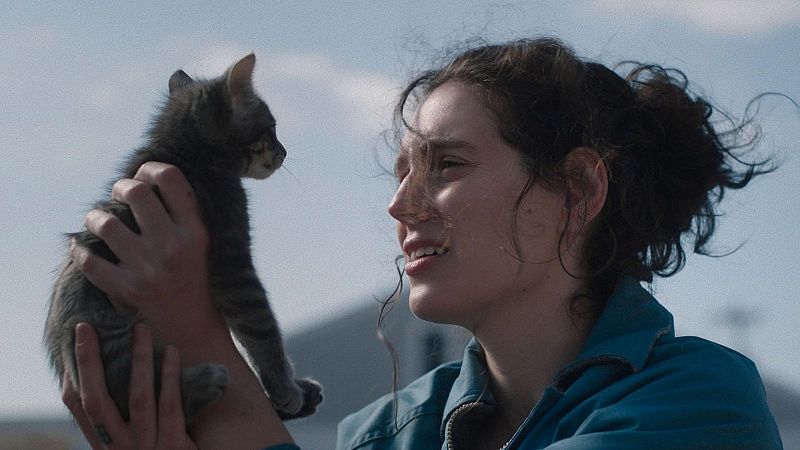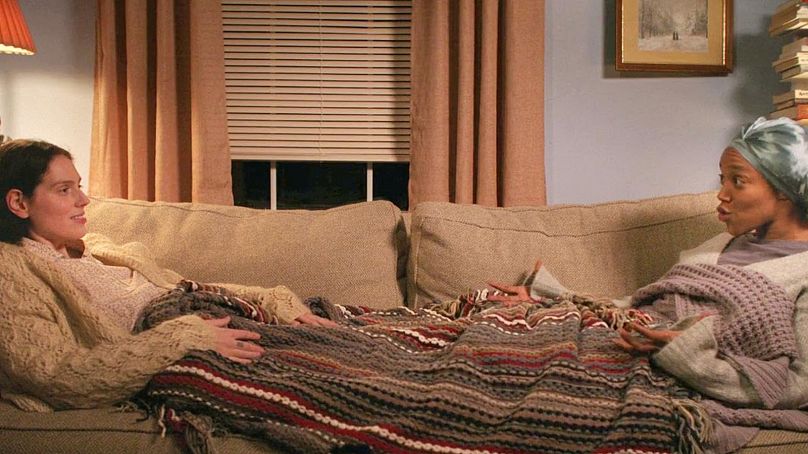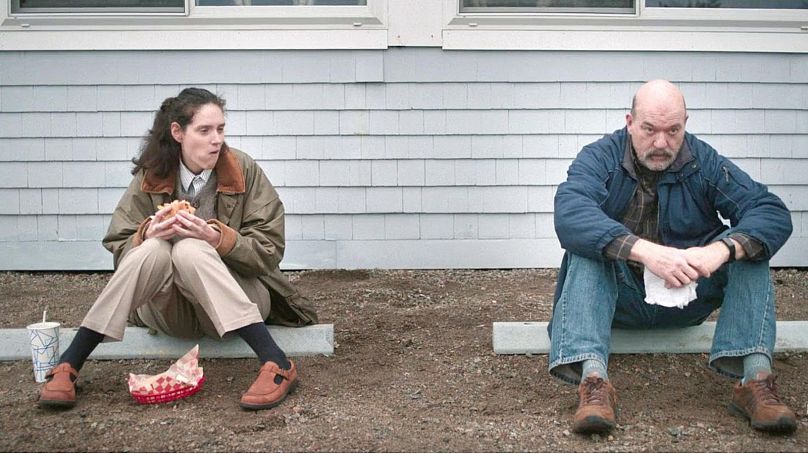Euronews Culture's Film of the Week: 'Sorry, Baby' - A masterful exploration of coping with trauma

The scariest thing about life’s worst moments is the silence in which they often unfold. The world goes on, night falls, the windows of a suburban house glow as cars drive by. Yet for the person inside, existence has cracked; an irrevocable disconnect between who you once were, and the confused ghost you’ve become.
These subtle, sinewy emotional grapplings are at the heart of Sorry, Baby, the powerful semi-autobiographical directorial debut from Eva Victor, which tells the story of a young academic navigating the aftermath of trauma.
Split into chapters told in non-chronological order, each covers roughly four years of Agnes’ (Victor) life - from her present life as a college professor, to when the “bad thing” happened, to all the flickers of disorientation, revelation, and healing that unfolded in between.
We begin in ‘The Year with the Baby’, as Agnes' best friend Lydie (Naomie Ackie) arrives to visit her in the wooded disquiet of a New England town. We learn that the two first met while completing their English literature PHDs, but Lydie has since moved to New York with her girlfriend - and is now pregnant. At this news, Agnes seems happy, but uncomfortable. There’s a flicker of uncertainty in her eyes, the sense of some internal anxieties tugging at optimism.
We come to realise that Agnes was sexually assaulted by her college professor, Decker (Louis Cancelmi). His seemingly genuine admiration of her “exceptional” work soon turns into an invite to his house to go over her thesis. After Agnes disappears inside the white house, we’re left as frozen bystanders, staring at the stillness outside as our imaginations sharpen. It's in this way that Victor masterfully captures the eerie mundanity of trauma, an unknowable darkness that dwells behind white picket fences and warmly-lit windows.
After Agnes leaves, the silence continues. A long tracking shot follows her to her car, then focuses on her expression - blank yet strange - as she drives home. For every person that has experienced something similar, it’s a scene swollen with a familiar sense of internal shock; of stepping back into a reality that no longer feels real.
This refusal to sensationalise the trauma reflects Victor’s own aims. In an interview with the Sundance Institute, she said: "There’s a part of my experience of trauma that I haven’t seen on-screen often: the part where you’re confused. Where you wonder, ‘Did that really happen to me?’"
While many movies and TV shows have expertly tackled the complexities of sexual trauma, including Gregg Araki's Mysterious Skin (2004) and Michaela Coel's I May Destroy You (2020), Sorry, Baby avoids any of their visceral displays of brutality. Instead of focusing on the assault, it reveals itself to be a quiet meditation on acceptance that’s ultimately optimistic.
After stepping outside for a coffee one morning, Agnes discovers a little grey cat. Holding it against her chest, its purrs loudly vibrating, she exclaims with exhausted relief: “fuck.” Later on, she shares a sandwich with a stranger after having a panic attack, talking through the tangle of her thoughts. These moments are reminiscent of Wim Wenders’ Perfect Days (2023), a film that focuses on the contentment to be found in simplicity, as Victor reminds us that life’s smallest glimmers are what sustain and slowly heal us.
At a time when trauma has become a default subject of horror movies in particular, it's Sorry, Baby's gentleness that makes it feel most impactful. There are no decapitated heads or grinning demons - trauma here isn't a metaphorical monster to be reckoned with. It's more of an intangible presence, a haunting that ebbs and flows through Agnes' body but can't be easily classified or violently expelled.
Fear can instead be felt in the unnerving calm of the darkened forest settings, or the nighttime creaks of Agnes' house. There's a paranoia that's always there, heightened by a world which suddenly feels unsafe. But this feeling never lingers for too long, always giving way to humour's succour.
From Agnes’ awkward exchanges with her college’s HR (“We know what you’re going through. We are… women”), to her momentary impulse to burn Decker’s office down before settling on making hot dogs, Victor deftly manages her tone between light and dark: the pendulum swing of coping.
“I’m sorry that bad things are going to happen to you,” Agnes tells Lydie’s baby, cradling their innocence while acknowledging its inevitable destruction. It’s a poignant reminder of human fragility and collective pain, which stings, but also offers great comfort. While we can’t control what happens to us, we can find buoys through love and understanding. Friendship, kind strangers, cuddly cats - these are the things that piece us back together, and make silence feel safe again.
Sorry, Baby is out in UK and Ireland cinemas now, with a scheduled release across Norway, Sweden and Germany in the coming months.
Today



